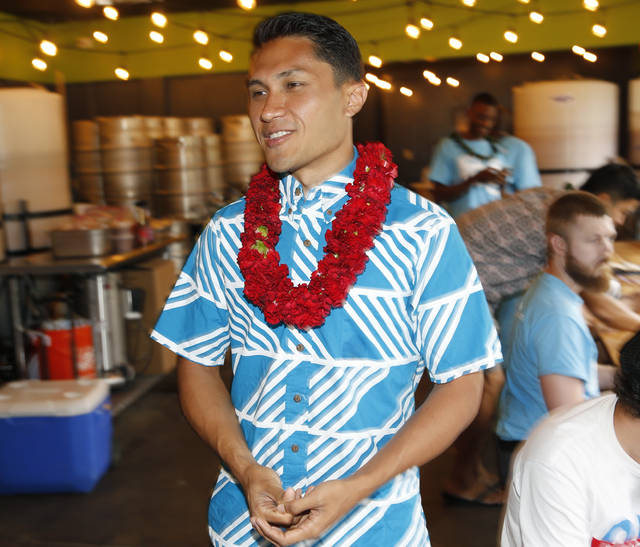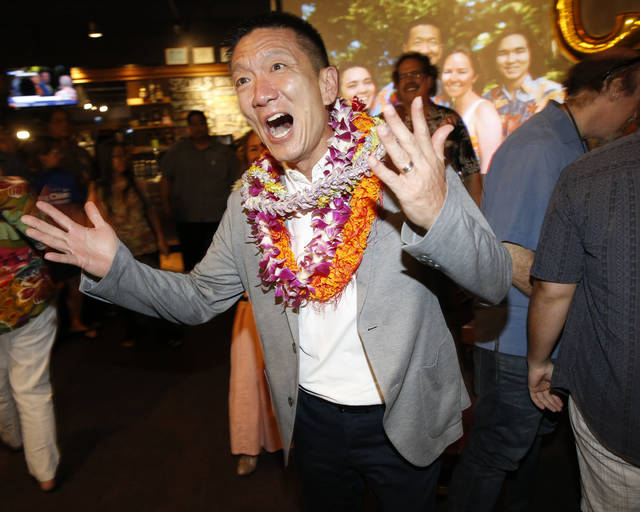HONOLULU — Former Congressman Ed Case has emerged from a crowded field to win the Democratic Party primary Saturday to represent Honolulu in Congress.
The 65-year-old fiscal conservative on Saturday defeated five other major candidates including Lt. Gov. Doug Chin, who is the architect of Hawaii’s legal battle against President Donald Trump’s travel ban.
The winner of the Democratic primary is almost guaranteed to win in the general election in Hawaii.
Asami Kobayashi, who has been volunteering for the Case campaign, said she liked his message of bipartisanship.
“That’s something that we really need right now when Congress seems to be really divided,” Kobayashi said.
The seat was open because U.S. Rep. Colleen Hanabusa is challenging one-term incumbent Gov. David Ige in the gubernatorial primary.
Both Hanabusa and Ige are experienced, long-time politicians in Hawaii, leading to a close race. Ige was ahead of Hanabusa in early results.
Jinjer Boots, 26, a Democrat, voted for Hanabusa. As she left her polling place Saturday with her daughter, Cataleia, 3, Boots said Hanabusa is fighting for women’s rights and that was a major factor for her.
“I like that she fights for women’s rights,” she said. “I do think that she will speak up more for us, with Ige he was very quiet.”
Three Republicans, including House Minority Leader state Rep. Andria Tupola, are vying for the Republican nomination. Former Pearl Harbor nonprofit CEO Ray L’Heureux and former state senator John Carroll are the other two.
Daryl Chang, a Republican who works in the medical field in Honolulu, voted for a Democrat in Saturday’s gubernatorial primary.
“I voted for Ige” Chang said.
“Ige is quiet,” Chang said. “I think he is thoughtful and he does what he thinks is right.”
Some in Hawaii have been critical of Ige’s response to the false missile alert, but Chang, 64, said he doesn’t see the governor as being ultimately responsible.
“There’s deficiencies in all the departments.” Chang said of the emergency department that sent the alert. “I didn’t blame Ige for it.”
Robert Quartero, 50, a Native Hawaiian and community organizer from Honolulu, said he didn’t know who he would vote for in the gubernatorial race, even as he stood outside a polling station.
“In this election, I’m still not decided. I haven’t voted yet today,” he said.
Quartero, who has lived in Hawaii his entire life, said Ige’s first term has been marked by a lack of leadership, “especially running away from the missile crisis and disappearing,” he said.
Quartero also criticized the governor’s handling of flooding on Kauai and the volcanic eruption on the Big Island, saying Ige only shows up after the worst of a disaster is over.
“Ige hides until everything clears up and then he come out and he’s like, ‘OK how we going to fix this?’” Quartero said. “For me, Ige is not a leader.”
He doesn’t like Hanabusa for governor, either, saying she’s become “too entangled” with unethical people in the community.
The GOP is fielding candidates in five of the 13 state Senate districts up for election this year. It has candidates running in less than 20 of the state’s 51 House districts.
Turnout for the last midterm primary election in 2014 was 41.5 percent.
The state has made it easier to vote this year, allowing people to register on the day of the election at their polling place. People used to have to register a month before the election.
Hawaii has open primaries, meaning voters don’t have to be members of a political party to vote for its candidates.





I think Hwaii’s voters are sick and tired of the same loud mouthed politicians who support homosexuality and how illegal immigrants abuse our social system and one of the main reasons Case won against Chen by such a wide amount.